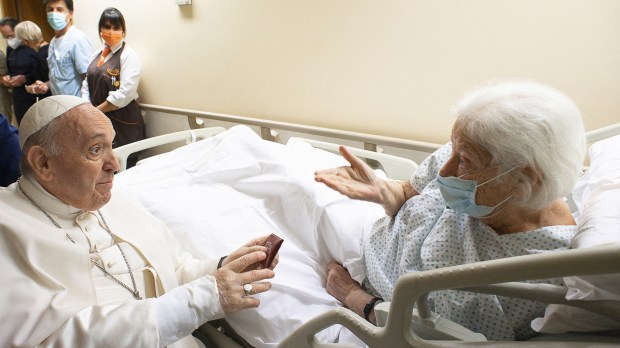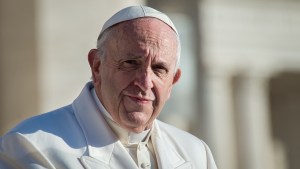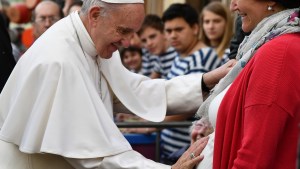Pope Francis insists that no life is “unworthy” and the no one should be “rejected because they do not respond to the criterion of usefulness or the demands of profit.”
The Pope said this October 18 in an address to a delegation from the Campus Bio-Medico University Hospital of Rome. Founded in 1993, the Catholic institution was inspired by Blessed Alvaro del Portillo, the Spanish bishop of the Opus Dei prelature who succeeded St. Josemaria Escriva in leading the prelature.
Continuing with his point, the Holy Father reflected:
We are living in a real throwaway culture: this is something in the air that we breathe and we must react against this throwaway culture.
The Pope urged that Catholic health care institutions should be leaders in a type of care that gives priority to the person such that in a Catholic hospital, you don’t see just doctors and patients, but “people, whom we receive in help.”
Here, he said, you “encounter firsthand the therapy of human dignity. And this should never be negotiated, it should always be defended.”
While the importance of science and research must be emphasized, the focus is on caring for the individual, Francis said.
Because treatment without science is vain, just as science without treatment is barren. The two things go together, and only together do they make medicine an art, an art that involves head and heart, that combines knowledge and compassion, professionalism and pity, competence and empathy.
Profit can’t be first
Francis also warned against the tendency to seek profit above all, “forgetting that the needs of the sick come before the opportunities for profit.”
In this context, he stressed the importance of networking and teamwork.
“The pandemic has shown us the importance of connecting, of collaborating, of tackling common problems together,” he said. “Health care, particularly Catholic health care, has and will increasingly need this, to be in a network, which is a way of expressing togetherness. It is no longer time to follow one’s own charism in isolation. Charity demands giving: knowledge must be shared, expertise must be shared, science must be pooled.”
Pope Francis noted how science, if not taken in a context, can offer mere band-aid solutions. For example, he noted, in the issue of vaccines. While there is an “urgent need to help countries that have fewer of them,” he said, “this must be done with far-sighted plans.” Vaccine distribution should not be motivated “by the haste of wealthy nations to be safer.”
“Remedies must be distributed with dignity, not as pitiful handouts. To truly do good, we need to promote science and its integral application,” he continued. The Pope made a similar point some days ago, noting how in certain areas, a push to wash hands frequently in order to ward off the coronavirus, would be useless as the people in shantytowns don’t have running water or soap.
“It is not easy, it is a real mission,” Francis said, “and I hope that Catholic health care will be increasingly active in this sense, as an expression of an outgoing Church.”



